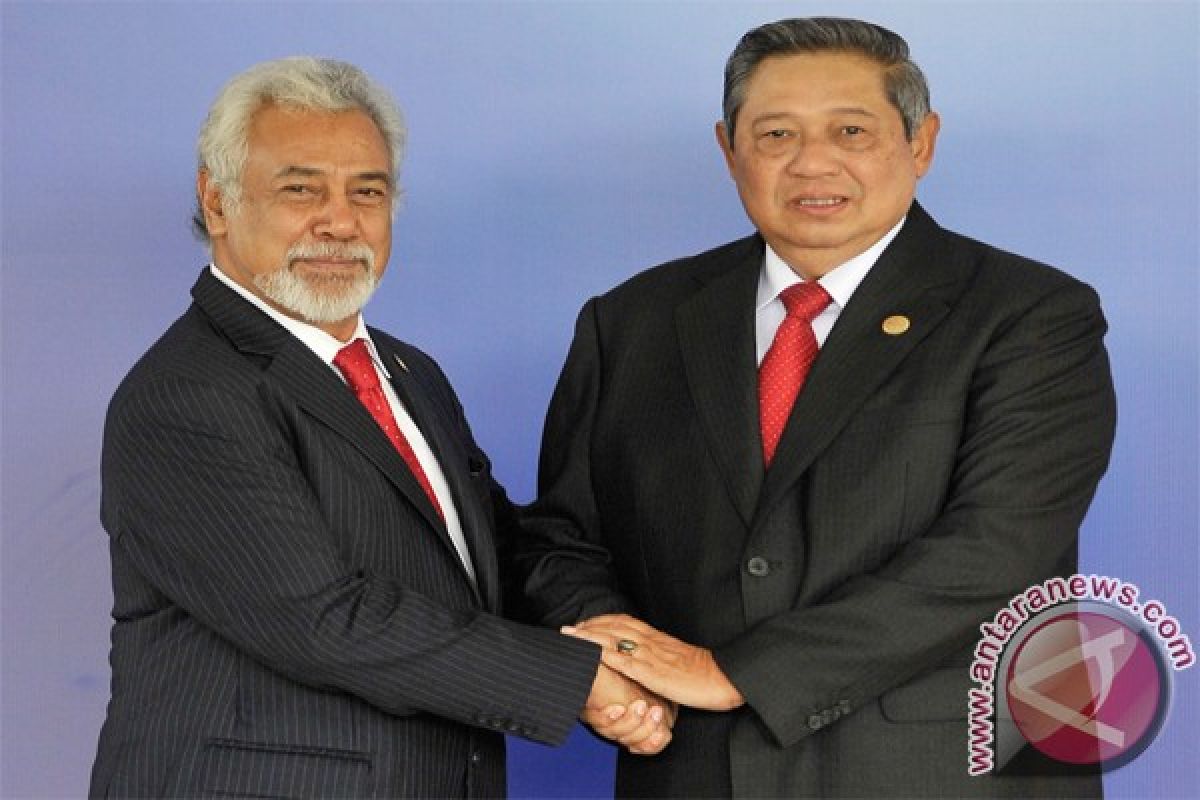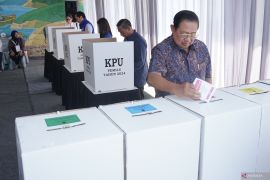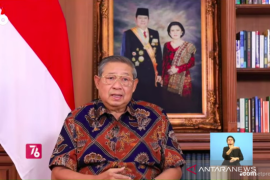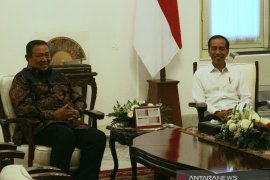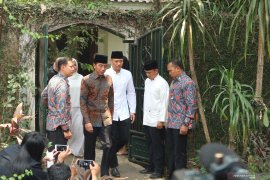Both the governments are strongly committed and eager to overcome issues in the past and build a better future."Jakarta (ANTARA News) - The recent visit of the Indonesian president to Timor Leste has further strengthened bilateral relations between the two neighboring countries that were once in conflict immediately following a referendum in the former East Timor Province.
President Susilo Bambang Yudhoyono had visited Dili, Timor Leste, on August 25-27, 2014--his second official visit to the half-island state after the previous visit in May 2012--at the invitation of Timor Leste President Taur Matan Ruak.
Yudhoyono stated that Timor Leste is an important neighbor and a good friend of Indonesia. "I am grateful for the contribution of Timor Lestes figures in strengthening bilateral relations with Indonesia," Yudhoyono remarked.
He said his government was committed to maintaining smooth relations. "Good neighborly politics has become the philosophy and basic principle of our government," Yudhoyono stated.
Sharing the view on the importance of maintaining sound bilateral ties with Indonesia, President Mantan Ruak and Prime Minister Xanana Gusmao expressed belief that the bilateral ties of Indonesia and Timor Leste should be an example to other neighboring countries.
President Matan Ruak suggested an establishment of bilateral forum to share the two countries experiences on peace building and post conflict reconciliation, with other nations.
The history of Indonesia and Timor Leste, which were once involved in conflicts, does not hamper their intention to carry out bilateral reconciliation.
"Both the governments are strongly committed and eager to overcome issues in the past and build a better future," Yudhoyono noted.
A key to maintaining good neighborly ties is mutual respect, according to him.
Later, Yudhoyono tweeted that Indonesia and Timor Leste had agreed to strengthen bilateral relations in various fields, particularly the development sector.
Timor Leste, which was formerly called East Timor and a former colony of Portugal, had integrated into Indonesia in 1975. East Timor comprised the eastern half of Indonesias the island of Timor.
On August 30, 1999, in a UN-sponsored referendum, an overwhelming majority of East Timorese had voted for independence from Indonesia.
Following a UN-administered transition period, East Timor was internationally recognized as an independent nation on May 20, 2002.
Upon arriving at Dili on August 25, President Yudhoyono, First Lady Ani Yudhoyono, and entourage proceeded to Seroja Heroes Cemetery to pay respect to Indonesias fallen heroes.
He laid a wreath and scattered flowers on the graves of the soldiers, First Private Kabul, who died on May 4, 1985, and Corporal Kastun, who died on June 22, 1998.
President Yudhoyono, who had completed several tours of duty in East Timor during 1976-1977, 1979-1980, and 1986-1988, looked for the graves of his friends and subordinates at the cemetery.
After visiting the Seroja Heroes Cemetery, Yudhoyono then proceeded to the Metinaro Heroes Cemetery to lay a wreath in tribute to the fallen heroes of Timor Leste.
Earlier, presidential special staff for international relations Teuku Faizasyah had stated that the Indonesian head of state was scheduled to meet Timor Lestes President Taur Matan Ruak and Prime Minister Kay Rala Xanana Gusmao during a three-day state visit.
"Cooperation in the fields of economy, education, connectivity, and people-to-people interaction will be some of the topics that will be discussed during the meeting. The leaders will also discuss regional and global issues that have been causes of concern for the two countries," Teuku Faizasyah stated.
Indonesia and Timor Leste signed a Memoranda of Understanding on cooperation in maritime affairs, fisheries, education and culture, information technology, and regional economic development approach, while Yudhoyono was in Dili.
During a luncheon attended by Timor Leste President Taur Matan Ruak, Prime Minister Kay Rala Xanana Gusmao, former prime minister Mari Alkatiri, and former president Ramos Horta, on August 26, Yudhoyono reiterated the Indonesian governments support for the acceptance of Timor Leste into the Association of Southeast Asian Nations (ASEAN).
"Indonesia has not only supported but also continued to encourage other ASEAN member states to support Timor Leste," President Yudhoyono said at the Nicolau Lobato Presidential Palace.
The Indonesian leader further praised Timor Leste for recording rapid economic growth. According to the Asian Development Bank, Timor Lestes economy had grown by 8.1 percent in 2013 and is expected to further increase to 8.5 percent this year.
Yudhoyono, who will end his term of office on October 20, 2014, expressed his optimism that the next Indonesian government under the leadership of President-elect Joko "Jokowi" Widodo and Vice President-elect Jusuf Kalla will be able to maintain and increase the existing good relations with Timor Leste.
"I am optimistic that the newly elected Indonesian President Jokowi and Vice President Jusuf Kalla will be committed to maintaining good relations between Indonesia and Timor Leste," Yudhoyono noted.
On August 27, Yudhoyono officiated the groundbreaking ceremony of the Indonesian Cultural Center in the capital city of Timor Leste, Dili.
The construction of the 5.7-thousand square meter cultural center is expected to be completed by October 2015 and will have four floors and a basement. The total budget of the construction is Rp90 billion.
The center will have a smart room, exhibition room, amphitheater, library, mini theater, computer laboratory, meeting hall, and a coffee shop.
In the meantime, Prime Minister Xanana Gusmao expressed hope that the center will further strengthen the relations between the two countries.
"I hope that it will deepen the relations and increase the prosperity of the two countries in the future," he affirmed.
President Yudhoyono and President Taur Matan Ruak planted trees in the front yard of the building to mark its development.
Yudhoyono, on the occasion, also donated more than ten thousand trees, including rain tree, for planting in the neighboring country.
(T.F001/INE/KR-BSR/A014)
Reporter: Fardah
Editor: Priyambodo RH
Copyright © ANTARA 2014
